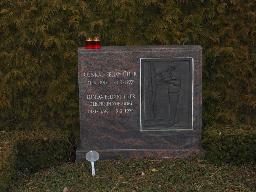Felixmüller, Conrad |
| PAINTER, GRAPHICAL ARTIST (GERMANY) |
|
BORN 21 May 1897, Dresden, Sachsen - DIED 24 Mar 1977, Berlin: Zehlendorf BIRTH NAME Müller, Conrad Felix GRAVE LOCATION Berlin: Städtischer Friedhof Zehlendorf, Onkel-Tom-Straße 30 (Abt. 25W-221 Feld 019 (Ehrengrab)) |
|
Conrad Felixmüller was the son of the factory blacksmith Ernst Emil Müller from Dresden. He studied music but he gave it up in 1911 and in 1912 he entered the Art Academy in Dresden. The painter Peter August Böckstiegel became a close friend and in 1919 he married Conrad's sister Hanna (d.1988). In 1914 he became a pupil of Carl Bantzer. In 1915 he started as a freelance artist and in 1916 he exhibited at the Galerie Sturm in Berlin. In 1917 he refused military service. He married Londa Freiin von Berg in 1918 and they had two sons. Also in 1918, art collector Heinrich Kirchhoff from Wiesbaden became his patron for two years. In 1919 he was a co-founder of the Secession Group in Dresden. He was a member of the German communistic party KPD from 1919 to 1924. In 1925 he adopted the name Felixmüller. In 1928 he won the grand prize of the Art Association of Saxony and in 1929 he exhibited at the Gurlitt galerry in Berlin. In the same year he painted a portrait of Pamela Wedekind. In 1933 the nazis classified his work as degenerate art and his work was removed from public collections in 1937. In 1938 and 1939 many of his works were destroyed. After his home in Berlin was destroyed by a bomb raid he moved to Tautenhain near Leipzig. He served in the army for a short time and he was captured by the Soviets in 1945. In 1949 he was appointed professor in Halle. There he taught until his retirement in 1961. He returned to Berlin and lived in Köpenick in East Berlin. In 1967 he moved to Zehlendorf in West Berlin. He died there in 1977. Related persons • was a friend of Bosseljon, Berndt • met Gurlitt, Cornelia • knew Lachnit, Wilhelm • painted Wedekind, Pamela |
| Images |
Sources • Hammer, Klaus, Historische Friedhöfe & Grabmäler in Berlin, Stattbuch Verlag, Berlin, 1994 |



